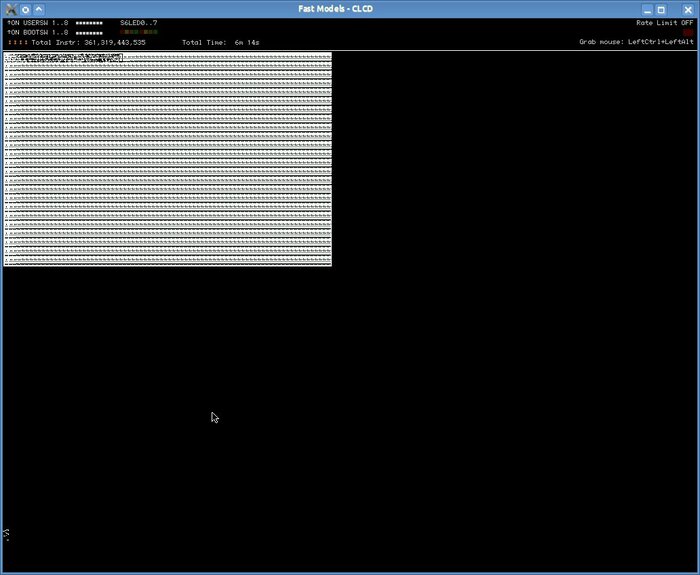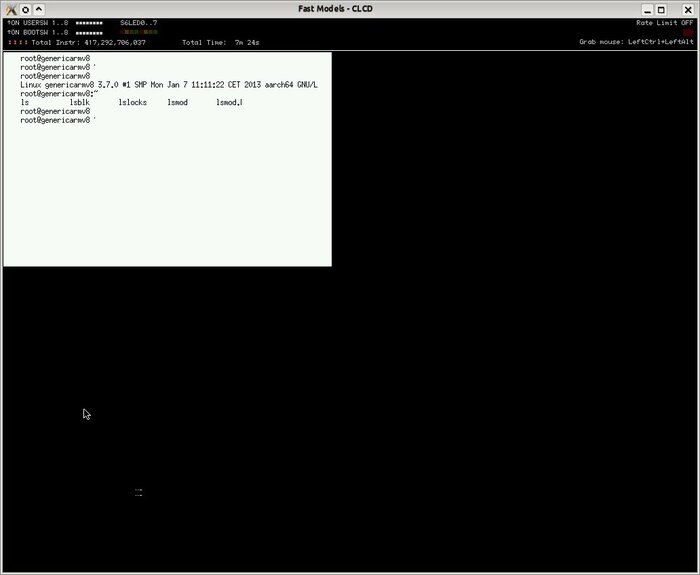Year ago we had Linaro Connect right after FOSDEM so I decided to skip and walk to Golden Gate instead. But this year there were no conflicts!
Months before we had discussion on SzLUUG mailing list about who goes for FOSDEM. There were about 9 people wanting and we ended with five. So on Friday morning friends arrived near my house, I jumped into car, we grabbed 4th one (Tomek was in London at that time) and went to Berlin Schönefeld airport for 07:00 Easyjet flight.
And we missed it… 5-10 minutes late we were ;( 75€ per person and 10 hours later he took off from SXF airport.
But that 10h was not wasted. Berlin has very nice Technical Museum with many trains, cars, planes and other exhibitions. And they had Trabant 601 as well:
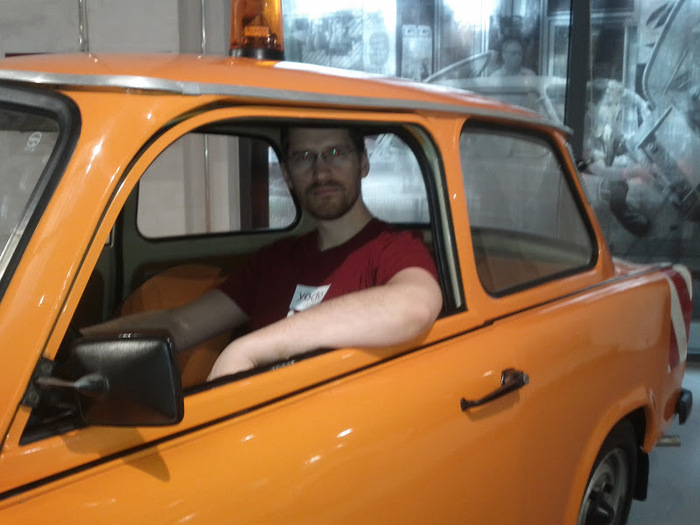
Then trip to shops (Saturn, Media Markt) in search for HTC Desire X case (Magda) and LG Nexus 4 (me). Avoid Saturn — they do not handle credit card payments at Alexanderplatz so I had to walk to the ATM. Two S-Bahns later we passed security check and went to the gate early enough to fly.
BRU airport… I think that (with exception of SXF/TXL) it is my most visited airport as it was my 5th FOSDEM and there was UDS-M around as well. But this time we took a bus instead of a train. 14€ ticket works for 72 hours so cover all trips perfectly. Few hours later we were joking that this multi country journey was exhausting as we were in Berlin, Brussels, went though Geneve (bus stop) to Luxembourg (square) and passed near London (restaurant) ;D
Hotel, drop stuff, connect chargers, went for beer event. Crowdy as usual it was. But I managed to meet some friends (but also missed lot of them) and grabbed few beers. Good spent time. Too bad that I was so tired that went back to hotel just right after midnight.
Saturday
Breakfast in St. Nicolas hotel maybe is not the best but provides enough energy to survive a day. Met several guys there, Philip gave me Kindle Paperwhite which I bought few days before (with delivery to his house to lower price) and his famous Belgium/Holland/Luxembourg guidebook. I also got Beagle pendrive from Koen.

Then overcrowded bus 71 and FOSDEM! I told Bartek where things are (but at that time I had no idea of K building) and we split. In AW building I met friends manning OpenEmbedded stand just right in front of building entry.
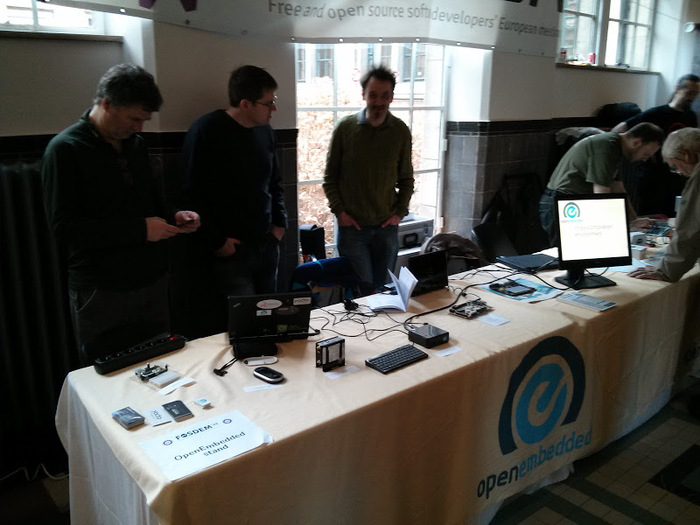
Circuitco had Beaglebone stand right to it:
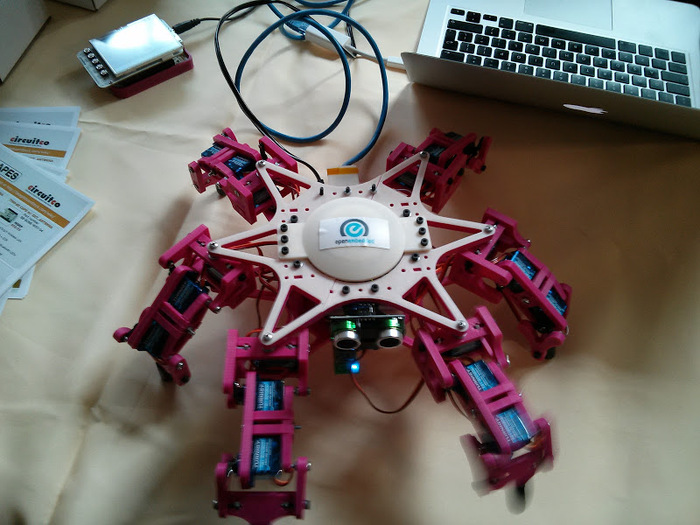
That robot was great example what you can do with enough signals available to drive all those motors. And what you can do with 3D printers ;D
I do not know is it due to crisis or something but AW building had just half of a space for stands used…
Then I went for talks:
- “Embedded distro shootout: buildroot vs. Debian” — wasted time. Long discussion about Emdebian + short info that Buildroot works in other way. Could be nice talk if done in other way.
- “Porting Fedora to 64-bit ARM systems” — talk done by Jon Masters and his clone. As usual first “what the hell is 64-bit ARM” and then how Fedora bootstraps itself. Nice talk, got some new stuff. Have to dig for Cavium SDK.
- “Porting OpenJDK to AArch64” — interesting it was. Two speakers, lot of technical details.
- “ARMv8, ARM’s new architecture including 64-bit” by Andrew Wafaa. Mostly to catch speaker in easy way ;D
- “Bootstrapping Debian-based distributions for new architectures” - I was lazy to go somewhere else but it was good talk.
- “Bootstrapping the Debian/Ubuntu arm64 ports” by Wookey. Kind of recycled talk from Barcelona but I like his presentations. Also first one without “what the hell is armv8” introduction.
I also had nice discussion with Jolla guys about their system/device and would I like to test it once they will have something ready for complains. Played a bit with Firefox OS on their reference developer platform and on Nexus S and was not impressed — for example it looked like they have to learn about DPI…
Then I met OE crew and few other guys and when finally noticed that it is time to go to the hotel and drop gear there. Once arrived it was a bit to late to go somewhere and search for some event so I joined SzLUUG team and we went for a meal, chocolates and then some drinking.
Sunday
Breakfast, packing gear and go for a bus which was less crowded than day before (but we are a bit late as well). As we had to leave after 14:00 I managed only two talks:
- “systemd, Two Years Later” — some Ubuntu trolling and project status. Nice talk.
- “Porting applications to 64-Bit ARM Architecture” by Riku Voipio (main AArch64 porter at Linaro). Good discussion in a room, some nice hints and suggestions. Read his recent blog post about ARMv8 porting
Then walk, tram, bus and security check. This time I did not have to take developer boards from backpack as I gave them away during event. We arrived in Berlin and (due to Michał’s fosdem flu) I drove us back home.
Summary
It was great event as usual. But distance between K building and rest was too big for sessions which are one after another. I dropped some entries from my calendar just because it would be H->K->H->K switching.
Android application for schedule was ok. Would be nice to make a bigger effort and update it to cover K building as well and add a way to see what is going on in each building/room to reduce time before sessions.
Funny part
On Saturday I realized that for some reason I may remind Jon Masters… That’s due to hardware I had with me:
- two developer boards
- two phones
- two tablets
- 3 USB chargers
- 4 microUSB cables
The good thing is that they were not of same type (except some cables) :D

